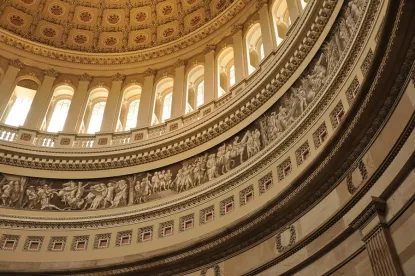Once again unto the breach.
With the five-bill package, members of the U.S. House of Representatives continue their pressure on Amazon, Apple, Facebook, and Google for what the legislators believe are anticompetitive practices by unregulated monopolies with too much power. That sentiment is shared by some antitrust enforcement agencies and private parties who have brought litigation against the giants of e-commerce, entertainment, social media, digital advertising, and internet search.
The House Judiciary Subcommittee on Antitrust, Commercial, and Administrative Law, led by Chairman David Cicilline (D-RI) and Ranking Member Ken Buck (R-CO), introduced what is being presented as a bipartisan package. The five bills are led by Reps. Cicilline, Mary Gay Scanlon (D-PA), Hakeem Jeffries (D-NY), Joe Neguse (D-CO), and Pramila Jayapal (D-WA). They would prohibit anti-competitive discrimination; enable users to communicate across platforms; block dominant digital platforms from buying competitors that threaten their businesses; increase funding for investigations and enforcement actions by the Federal Trade Commission and the Department of Justice Antitrust Division; and authorize the FTC and DOJ to break up vertically integrated companies if they are operating with a conflict of interest.
The New York Times characterized the reform package as “the most ambitious update to monopoly laws in decades,” and would “make it easier to break up businesses that use their dominance in one area to get a stronghold in another.” The measures would also make it harder for these companies to buy upstart, threatening, and sometimes “disruptive” competitors.
A constant leader in federal antitrust reform efforts, Rep. Cicilline said the companies "are in a unique position to pick winners and losers, destroy small businesses, raise prices on consumers and put folks out of work.” He said he hopes this package will level the competitive playing field in these markets.
Efforts to tighten the government’s control over these wildly successful and enormously powerful corporations have been floated over the years – at both the federal and state level – only to sink in the face of industry opposition and political disagreements. Yesterday, one such proposal failed to pass in the New York Assembly. Like today’s five-pack of bills, New York legislators focused on the big technology companies. Despite a partisan passage in the state Senate, the New York bill met its demise in the Assembly. Legislative efforts make up just one front in the effort to control the conduct of these e-juggernauts, each of which faces governmental and private litigation, as well as investigations in the U.S. and Europe. Efforts to regulate them more aggressively have been taken in Australia and India, according to the Times.
The package was unveiled on Rep. Cicilline’s website under the moniker “A Stronger Online Economy: Opportunity, Innovation, Choice,” following bipartisan drafting by members of the Antitrust Subcommittee. It also follows the Subcommittee’s 16-month investigation into the state of competition in the digital marketplace and the “unregulated power wielded by Amazon, Apple, Facebook, and Google.”
The five measures are:
-
The “American Innovation and Choice Online Act” to prohibit discriminatory conduct by dominant platforms, including a ban on self-preferencing and picking winners and losers online. The bill is sponsored by Chairman Cicilline and co-sponsored by U.S. Rep. Lance Gooden (TX-05).
-
The “Platform Competition and Opportunity Act” prohibits acquisitions of competitive threats by dominant platforms, as well acquisitions that expand or entrench the market power of online platforms. The bill is sponsored by U.S. Rep. Hakeem Jeffries (NY-08) and co-sponsored by Ranking Member Buck.
-
The “Ending Platform Monopolies Act” eliminates the ability of dominant platforms to leverage their control over across multiple business lines to self-preference and disadvantage competitors in ways that undermine free and fair competition. The bill is sponsored by U.S. Rep. Pramila Jayapal (WA-07) and co-sponsored by U.S. Rep. Lance Gooden (TX-05).
-
The “Augmenting Compatibility and Competition by Enabling Service Switching (ACCESS) Act” promotes competition online by lowering barriers to entry and switching costs for businesses and consumers through interoperability and data portability requirements. This bill is sponsored by U.S. Rep. Mary Gay Scanlon (PA-05) and co-sponsored by U.S. Rep. Burgess Owens (UT-04).
-
The “Merger Filing Fee Modernization Act” updates filing fees for mergers for the first time in two decades to ensure that Department of Justice and Federal Trade Commission have the resources they need to aggressively enforce the antitrust laws. This bill is sponsored by U.S. Rep. Joe Neguse (CO-02) and co-sponsored by U.S. Rep. Victoria Spartz (IN-05).
Responding to the news of these proposals, Charlotte Slaiman, Competition Policy Director at Public Knowledge, said, “We are losing the promise of the internet as powerful gatekeepers control access to increasingly wider swaths of online activity. Under this legislation, the FTC and DOJ will be equipped with the most effective tools yet to break open the gates. People should be free to bring new ideas to market and to choose something different when they’re frustrated with misinformation, privacy violations, or worker abuse. These potent bills are a turning point in the ongoing fight to rein in Big Tech.”
The package comes at a time when Congress struggles to agree on just about anything, and while the companies as well equipped as ever to defend themselves in court and on Capitol Hill. But reformers seem to be increasing in number and intensity. Their commitment only appears to be gaining steam as Democrats control both chambers of Congress – albeit narrowly – and occupy the White House. Also, the parties each have members who want to see antitrust reform, even if they have different reasons and motivations that range from their stated concern for consumers and innovation to their perceived anti-conservative bias and to what has been characterized as impositions on free speech.
The bills will now be referred to the House Judiciary Committee.



 />i
/>i
